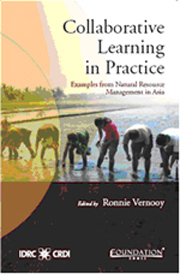Book contents
- Frontmatter
- Contents
- Foreword
- Acknowledgements
- Preface
- Chapter 1 Toward Centres of Excellence for CBNRM (Community-Based Natural Resource Management)
- Chapter 2 Participatory Research and Development in South Asia
- Chapter 3 Adaptive Learning: From Isang Bagsak to the ALL in CBNRM Programme
- Chapter 4 Mainstreaming CBNRM in Chinese Higher Education
- Chapter 5 Comparing the Case Studies
- References
- Notes on Contributors
- Index
Chapter 5 - Comparing the Case Studies
Published online by Cambridge University Press: 26 October 2011
- Frontmatter
- Contents
- Foreword
- Acknowledgements
- Preface
- Chapter 1 Toward Centres of Excellence for CBNRM (Community-Based Natural Resource Management)
- Chapter 2 Participatory Research and Development in South Asia
- Chapter 3 Adaptive Learning: From Isang Bagsak to the ALL in CBNRM Programme
- Chapter 4 Mainstreaming CBNRM in Chinese Higher Education
- Chapter 5 Comparing the Case Studies
- References
- Notes on Contributors
- Index
Summary
New constellations of learning
The three cases described in this book represent diverse but congruent, unfolding paths to learning – design, processes, and results. They include the development of holistic and dynamic curricula that integrate the various approaches and tools used in participatory CBNRM and PR & D research. The three initiatives offer curricula to different categories of learners – academics and graduate students; practitioners and researchers in the field; community groups; and policymakers. The three cases share the common feature of making curriculum development an emergent, collective, and adapative process, rather than establishment of a pre-set blueprint delivered by teachers or instructors who are the “know all” and “know best” and who are not truly engaged in the process.
The cases bring together the knowledge and expertise about CBNRM and PR & D of a diversity of people and organizations, working in a variety of political, socioeconomic and agro-ecological contexts. In all three cases, partners and participants have strengthened a number of important capacities – going beyond mere technical expertise, through a prolonged process of working and learning together. This pooling of expertise involves students, researchers, practitioners, community groups, policymakers, and staff of international organizations. Among those social actors are individuals who are either more or less experienced (in terms of dealing with rural development questions and being involved in capacity development processes), belonging to groups or organizations with often diverse histories.
- Type
- Chapter
- Information
- Collaborative Learning in PracticeExamples from Natural Resource Management in Asia, pp. 151 - 166Publisher: Foundation BooksPrint publication year: 2009

